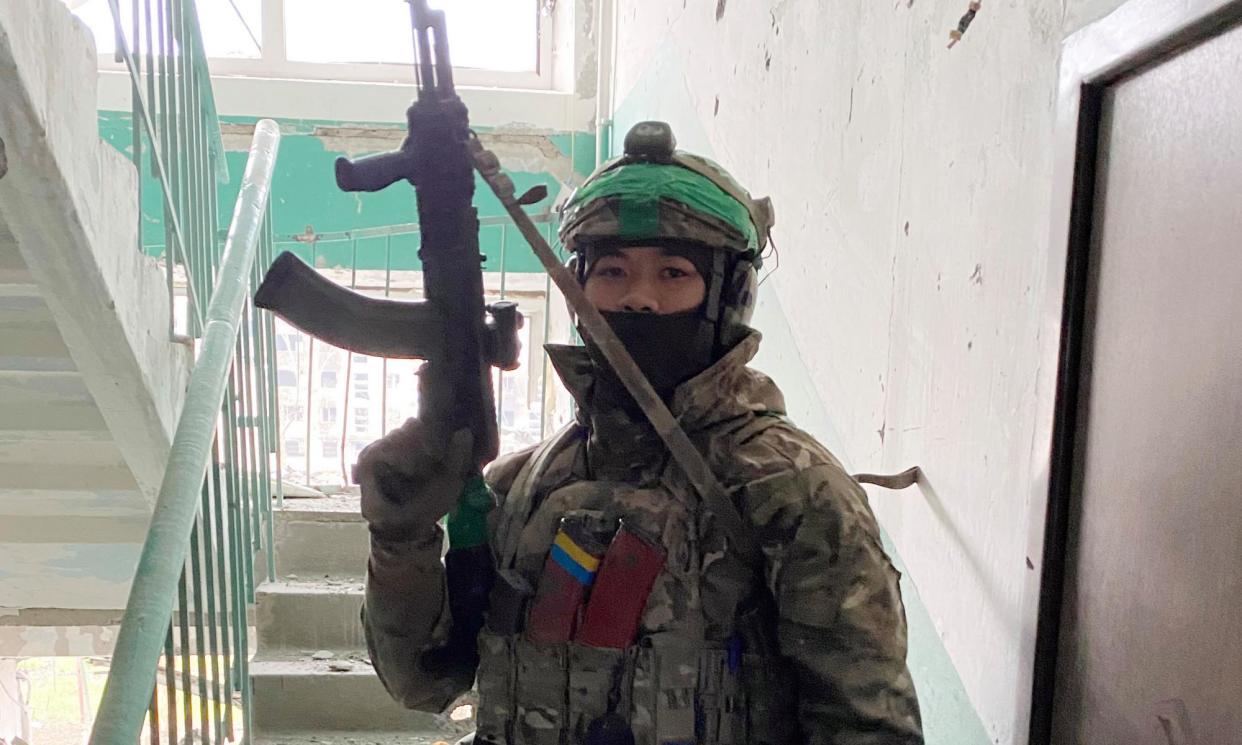‘This country gave me a lot’: the Vietnamese people staying in Ukraine

When Russia invaded Ukraine two years ago, Tung Nguyen drove his parents from their home, in the city of Chernihiv, to the border with Poland. Then, he returned to Kyiv and began to volunteer, bringing food and medicines to under-siege Chernihiv. Before long, he had decided to sign up and fight in the Ukrainian army.
Nguyen is part of Ukraine’s Vietnamese community, a sizeable but often hidden minority in the country. Some Vietnamese people left Ukraine after the Russian invasion, but others have stayed, particularly those from the younger generation, many of whom were born in Ukraine and are Ukrainian citizens.
Nguyen was raised in Hanoi by his grandparents, but he came to join his parents in Chernihiv when he was 18. He studied in Kyiv, learned Russian, and began working as a fitness trainer and bodybuilder. In 2019, he won the all-Ukraine championship, and was given citizenship so he could compete for the country on the international arena.
“Ukraine gave me a lot – I studied here, worked here, I married a Ukrainian. I can’t even say it’s my second homeland at this point, it’s just my homeland,” he said, in a Skype interview from his location at an army base.
Last May, he was wounded during the Ukrainian retreat from Bakhmut, while retrieving wounded comrades from close to the frontline under cover of night. Incoming artillery left him with cuts and severe internal bleeding, and he ended up spending a month in hospital. He returned to the front and was wounded again in December, requiring another two months of recovery. Now, he is back fighting again.
The two years of full-scale war has seen Ukrainians from across the country come together in the face of the Russian threat, and the country’s Vietnamese community is no exception. At least one Ukrainian soldier of Vietnamese origin has already been killed in the war, and Nguyen said the community rallied in solidarity when he was wounded.
“Before the start of full-scale war, I didn’t know many Vietnamese people, but now they support me a lot. Lots of Vietnamese people wrote me messages of support, people brought food to the hospital,” Nguyen said.
Vietnamese people began coming to the Soviet Union in the 1950s to study, usually for technical professions. Pham Nhat Vuong, now the richest man in Vietnam, made his first money while living in Kharkiv in the early 1990s, setting up the Mivina brand of instant noodles, which became a hit with Ukrainians during the lean post-communist years. Numerous Vietnamese politicians are alumni of Ukrainian universities. Later, in the 1990s, many more came to work as small traders to both Russia and Ukraine, including Nguyen’s parents, who settled in Chernihiv in the early 1990s.
Prior to the full-scale Russian invasion, the Vietnamese community numbered about 100,000 people, according to Serhiy Chervanchuk, executive director of the Ukraine-Vietnam Association in Kyiv.
One of the largest Vietnamese communities in the country is in Kharkiv. Vietnamese traders dominate Barabashovo, the sprawling market on the eastern side of the city, which prior to the war was one of Europe’s largest markets, and there is even a Buddhist temple used by the community, though the monks left after the outbreak of war.
Related: Kharkiv citizens: ‘They can bomb us for as long as they want: we will withstand it’
Many Vietnamese traders at Barabashovo, which has been hit by Russian strikes several times and is now working at a fraction of its former capacity, said they had left Ukraine at the start of the war but later returned.
“There aren’t many customers now, it’s a lot worse, but this is home and I don’t plan to leave again,” said one trader, drinking tea on a recent rainy morning, who gave his name as Dima. Most Vietnamese people at the market use Ukrainianised version of their names.
Across town, Nguyen Thi Thanh Nhan explained how she moved to Kharkiv more than two decades ago, marrying a man from her home town who was already working at the market there.
After many years working in the market, the family decided to set up a restaurant serving Vietnamese food. While she speaks only Vietnamese, her son, Tran Minh Duc, speaks fluent Ukrainian, Russian and English as well as the family’s native language. He studies radio electronics in the daytime and works shifts at the restaurant in the evening.
The legacy of war loomed over Nguyen’s upbringing in Vietnam. Her grandmother was shot during the Vietnam war, she said, and the legacy of the conflict played a large role in her education in school. It was a shock when the family was faced with war again, in Ukraine.
With Kharkiv on the frontline in the early months of the war, the family moved to Germany, and found work through contacts in a Vietnamese restaurant in Cologne. The younger children even started going to school, but after a couple of months the family missed Kharkiv too much and decided to return home.
“We got used to life here, we were sad when we were away. We love Ukraine and we didn’t want to be anywhere else,” said Nhan. They reopened the restaurant in June 2022, when Kharkiv was still a ghost town. The first customers were mainly police and soldiers. But life soon came back to the city, and the restaurant was busy with family dinners and date nights on one recent Monday evening. Even with the recent uptick in missile attacks on Kharkiv, Tran said the family has no plans to leave again.
Like many Vietnamese in Ukraine, the family has distant relatives living in Russia, where there is also a sizeable Vietnamese community. Communicating with them has been a little harder in recent times.
“My cousin called after the war started and asked how we were, but we didn’t get into the politics, we try not to talk about that,” said Tran.

 Yahoo News
Yahoo News 